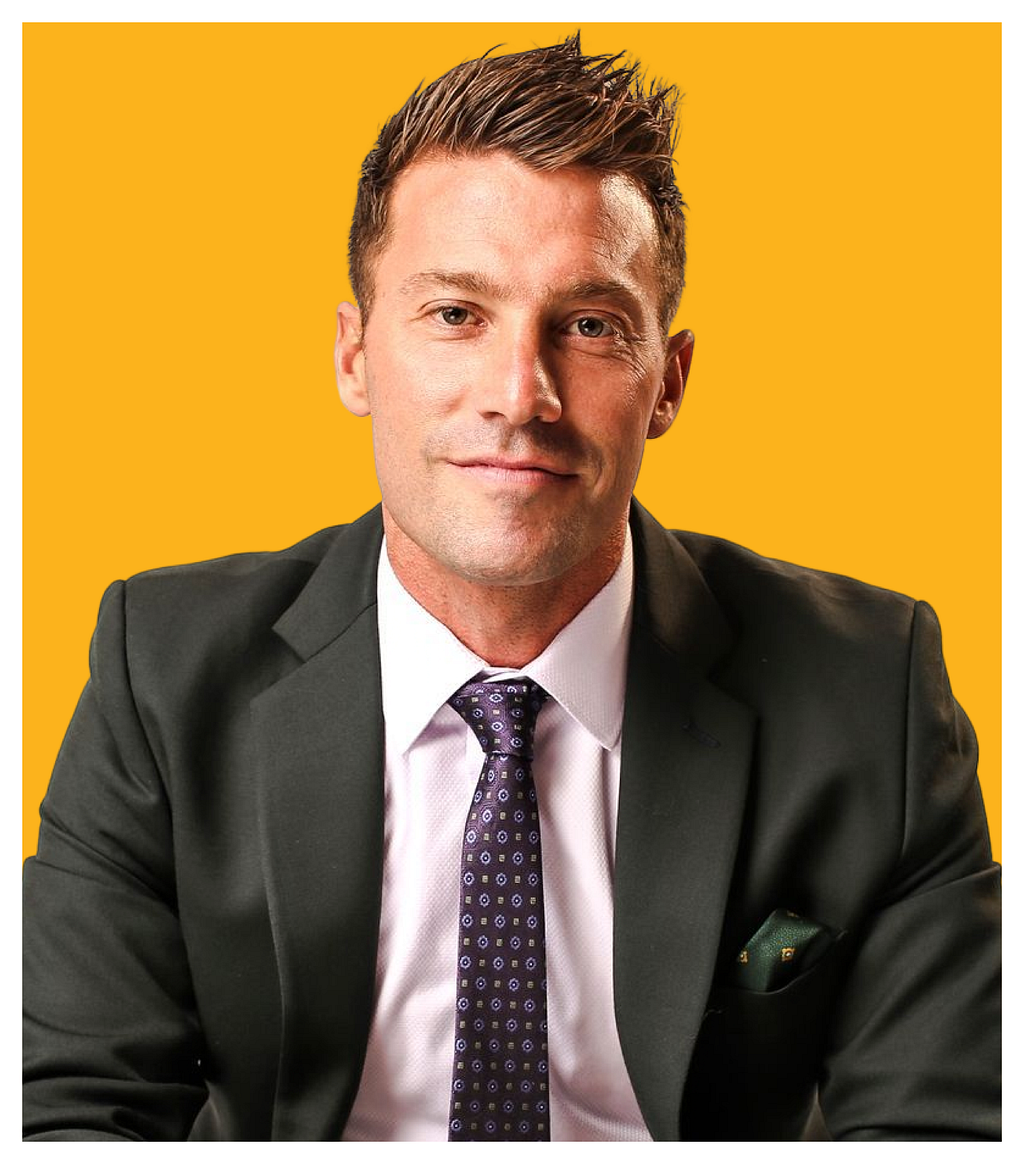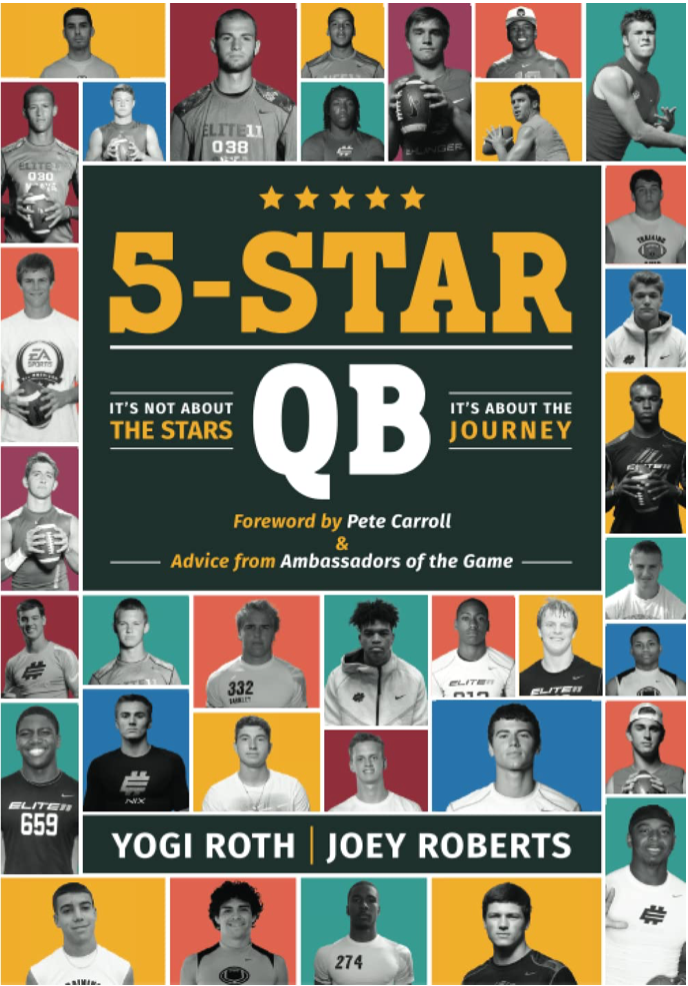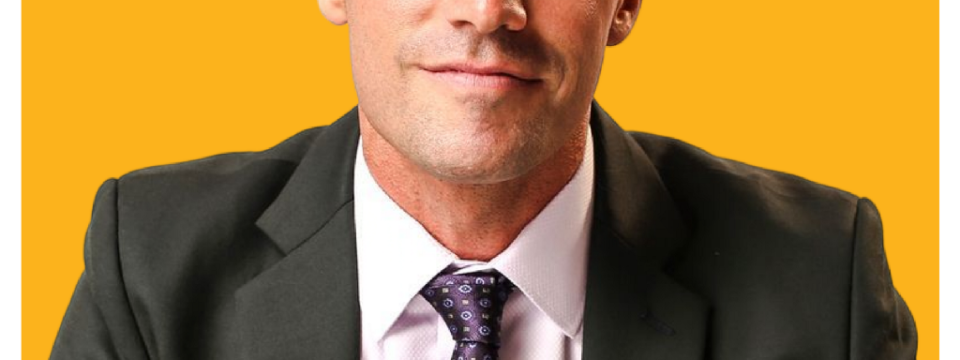
Fall in love — my life was so often committed to the next ‘project,’ but once I met my wife, had children, and began to truly understand what love meant, everything got better. My life improved, the joy for my craft improved and my focus dramatically improved as I would limit my focus on things that had true meaning.
As part of my series about “authors who are making an important social impact”, I had the pleasure of interviewing Yogi Roth.
Yogi Roth has been driven by the power of sports and story for over 20 years, as an on-air college football analyst, Elite 11 coach, Emmy Award-winning filmmaker, and New York Times best-selling author. A former Pitt wide receiver and USC coach, he is also a motivational speaker, tv and event host, and world traveler. To talk football, family, and storytelling, connect with him @YogiRoth.
Thank you so much for joining us in this interview series! Before we dive into the main focus of our interview, our readers would love to “get to know you” a bit better. Can you tell us a bit about your childhood backstory?
I grew up in a small town in northeastern Pennsylvania called Dalton. Population 2500 people with no stoplights. All we had, or so it seemed, was a core group of friends, a ball, and countless games to play. At night, I would often find myself playing basketball until my mom would call me in for bed. Looking back, I recall ‘broadcasting’ my own games on that asphalt, and recall that that small town, my core friends and our constant competition allowed me to fall in love with sports and feel that anything was possible.
When you were younger, was there a book that you read that inspired you to take action or changed your life? Can you share a story about that?
The Alchemist, hands down. I read it at 22 years old when I moved to Los Angeles. It had such an impact on my exploratory life that it took me almost two months to complete, as every few pages seemingly sent my mind on an unforgettable path. I can recall stating out loud in my small studio in Hermosa Beach, “I don’t know what my Personal Legend is, but I need to seek it.” From there, my international travels had direction and the only goal would be to get lost, to seek adventure and to gather stories along the way.
Can you share the funniest or most interesting mistake that occurred to you in the course of your career? What lesson or take away did you learn from that?
I was working the ESPYs for Entertainment Tonight as their red carpet correspondent while also auditioning for their co-host role. Someone called in sick and I got the opportunity to work my first red carpet event. Candidly, I had never been on a red carpet and had zero clue regarding the rules of entertainment television at an event like this. As I stood on the platform awaiting celebrities and elite athletes, the producer told me to ask them two basic questions, 1) “Would you rather win a championship in sports or an award in entertainment?” 2) “What are you wearing?”
After 45 minutes, we both could tell that the evening wasn’t going smoothly as the answers were just ok and my desire to ask those questions was worse than that. I asked him point blank, “Can I just do my thing?”
He said yes, assuming things couldn’t get much worse.
I began to ask questions around the humanity of sports, the power of inclusion in sports and the impact of cancer to each celebrity guest. Their answers were amazing, as was the night. That year the ESPYs were honoring Michael Sam, who was the first openly gay player drafted in the NFL, and Stuart Scott, who was competing against cancer. Simultaneously, my father was competing against prostate cancer and my brother had been openly gay since 2003. Both issues are important to me and that night I learned a critical lesson in storytelling–ask questions that you are interested in and the person on the other side of the microphone will be interested too. I’ve carried that with me ever since that evening. And no, I did not get the job at ET but will forever be indebted to that show for the opportunity, and subsequent lesson it provided me.
Can you describe how you aim to make a significant social impact with your book?
We hope that 5-Star QB meets parents and athletes where they are at on their journey and serves as a Tribe of Mentors of them in high school, college or beyond as they come across various challenges.
If there is one element that we hope each coach, parent and player hears is the chapter on mental health. We are at such a unique time in sports as high school and college players are signing with agents, being offered life-changing money, and having to deal with the dramatic expectations of others in their careers. We hope that they all front load mental skills when they get into recruiting and into college, are presented with mental health personnel when they arrive in college and train their minds as much, if not more, than they train their bodies.
Can you share with us the most interesting story that you shared in your book?
Ryan Perrilloux was one of the top quarterback recruits in the history of the game and when we interviewed him, he said something that I’ll never forget, “Yogi, I was living on a farm and one day I was a 5-Star QB and my life changed forever. I never asked for that.”
That stood out as a stark reminder that 99% of athletes do not play for attention, they play for a love of the game. But expectations and attention get placed on them without them ever asking for it. They then seem to have to live up to those expectations forever and rarely achieve it. Outsiders may deem them as ‘failures’ but I don’t. Ryan is a loving father, husband and successful professional and is the furthest thing from a failure.
A major theme in 5-Star QB is exactly that–these young men are not failures, in fact, they are the furthest thing from that.
What was the “aha moment” or series of events that made you decide to bring your message to the greater world? Can you share a story about that?
Joey Roberts and I have been involved in high school recruiting, college football, the NFL, and the Elite 11 in some form since 1996. We’ve seen the first rankings come out, the first bust, and over the last 15 years, the top quarterbacks in the most intimate settings in the Elite 11 camps. There we noticed one transcendent aspect of each QB experience every year: their love for the game. As their star shone brighter, their joy grew dimmer. As their hype intensified, their game fell apart. Simply stated, the recruiting rankings may have elevated their persona, but it led some QBs to crumble as young men. They, and often their families, struggled to manage the weight of that ranking and would seek counsel from us. After a decade, we recognized that we were often answering the same questions and with the growth of the transfer portal and Name, Image and Likeness (NIL), there were so many things that parents and players were evaluating outside of the X’s and O’s. So… Joey and I met at a coffee shop to brainstorm. When the caffeine kicked in, we decided it was time to do something. That something is in the pages of 5-Star QB.
Without sharing specific names, can you tell us a story about a particular individual who was impacted or helped by your cause?
A common theme we heard from the 54 quarterbacks in our book, or the 40 ambassadors who wrote a letter of advice to the parents and QBs was that answering our questions or writing a letter was therapeutic for them. Oftentimes, the past of most of these QBs gets buried deep in their bones and is painful to address. They all seemed thankful to have opened those wounds again, and some, finally having to deal with the trauma that came from their playing career.
Are there three things the community/society/politicians can do to help you address the root of the problem you are trying to solve?
Frontloading mental health, period.
I think that we must continue to compete to destigmatize mental health. As the pressure, hype and money increase around athletes lives so will anxiety, depression and unfortunately, suicide. This needs to be addressed by each coach, athletic director, politician and more from day one in an athlete’s high school and college career. Resources must also be allocated to support every coaching staff regarding mental health.
How do you define “Leadership”? Can you explain what you mean or give an example?
Create an environment where people feel seen and heard, while trusting that their lives will be elevated in the setting the leader cultivates.

What are your “5 things I wish someone told me when I first started” and why. Please share a story or example for each.
1. Slow down — it sounds corny but it’s true. Slow down, find purpose and attack one thing at a time while competing to enjoy each moment along the way.
2. You need a team — as a former walk-on in college football, my personality is to be a loner and just ‘work harder’ but the reality is that to achieve true success you need support.
3. Fall in love — my life was so often committed to the next ‘project,’ but once I met my wife, had children, and began to truly understand what love meant, everything got better. My life improved, the joy for my craft improved and my focus dramatically improved as I would limit my focus on things that had true meaning.
4. Talk to a therapist — like many people, the pandemic was a challenge and while I always supported the mental health industry and those who were a part of it, I never sought out help. In 2020 I did. It was life-changing. To simply talk to someone, gain another point of view and block out everything for an hour a week, or an hour a month was incredibly powerful. And I’ll do it for the remainder of my life.
5. The 15 minutes on the phone with your family will always be more important than the 15-minute call about business — I would say this, but my actions did not reflect it. I’d do anything for a 15-minute call with my mom. She passed away during the pandemic and thankfully time off from work allowed me to be with her but as I look back on my life, I often chose the ever-important phone call or meeting over the truly important phone call or meeting.
Can you please give us your favorite “Life Lesson Quote”? Can you share how that was relevant to you in your life?
“Move with intent but go with the flow.” Each year, on New Year’s Day, I choose a word. In 2022 it was ‘flow.’ I’ve always been focused but would fight the proverbial current in life, especially as a professional. Now, I set an intention, compete to achieve it and if a wave comes and sets me the other way down a wave then I flow with it. Ideally with a big grin :).
Is there a person in the world, or in the US with whom you would like to have a private breakfast or lunch with, and why? He or she might just see this, especially if we tag them. 🙂
Barack Obama. From the moment he began to run for office I’ve wanted to learn from him. His leadership traits, his humility, and his trust in what he believes in have always attracted me. And we would shoot hoops while talking. Steve Kerr would be next. A man who has seen great success, met unimaginable adversity and strives to use his influence for the better. These are two leaders who seek and uncover humanity in all walks of their lives.
How can our readers further follow your work online?
Just go to @YogiRoth on all social media and I’ll be happy to have a conversation! The book can be purchased here.
This was very meaningful, thank you so much. We wish you only continued success on your great work!
Social Impact Authors: How & Why Author Yogi Roth Is Helping To Change Our World was originally published in Authority Magazine on Medium, where people are continuing the conversation by highlighting and responding to this story.
